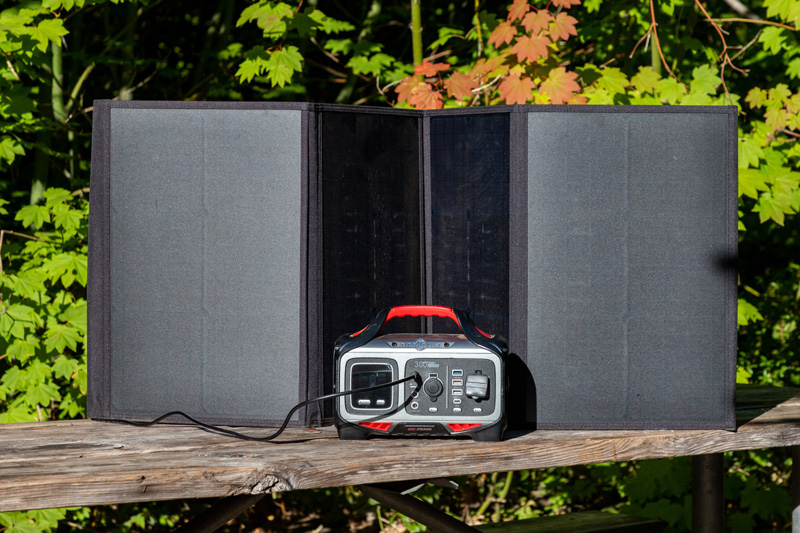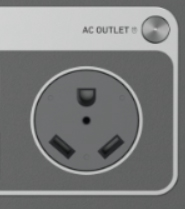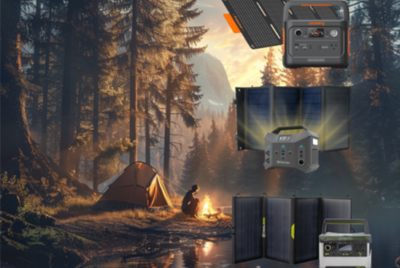Off Grid Solar Generators: Harnessing the Power of the Sun
Off grid solar generators are more than just a backup power source; they represent a significant step towards energy independence and sustainability. Such systems are designed to operate entirely separate from the municipal power grid, providing electricity through the collection and storage of solar energy. This approach is particularly appealing in areas where grid power is unreliable, expensive, or unavailable.
What is an Off-Grid Solar Generator?
An off-grid solar generator combines solar panels, a battery bank in the form of a solar generator with multiple power outlets, and an inverter. The inverter is built-in to a solar generator. This creates a standalone power system that is usually portable and can be used for both RV camping and cabins. This setup allows you to capture, store, and use solar energy without any connection to the traditional power grid. This is ideal for remote locations, from rural homes to mountain cabins, where grid access is either impractical or too costly. Solar generators can be easily used to power recreational vehicles.
The Growing Importance of Solar Power
Amidst growing environmental concerns and increasing energy costs, solar power has emerged as a key player in the global shift towards renewable energy. It’s clean, abundant, and increasingly cost-effective thanks to technological advancements and government subsidies. For many, turning to solar energy is not just an economic decision but a moral one, contributing to a reduced carbon footprint and a sustainable future.
Why Choose Off-Grid?
Going off-grid with solar power offers unparalleled independence in managing your energy needs. You are not subject to the vagaries of local utility prices, power outages, or policy changes. Off-grid systems also provide a practical solution in areas where the cost of extending power lines is prohibitively high. Moreover, they can increase property value, offering self-sufficiency in a world where energy needs are constantly growing.
Understanding the Components of Off-Grid Solar Systems
A robust off-grid solar system hinges on the harmony of its core components. Each plays a vital role in energy conversion, storage, and management.
Solar Panels: Capturing the Sun
Solar panels are the most visible part of a solar system. They convert sunlight into direct current (DC) electricity. The type of panel selected can significantly impact the efficiency of the entire system.
Types of Solar Panels
Monocrystalline panels, recognized by their uniform dark color and rounded edges, are highly efficient and perform well in low-light conditions. Polycrystalline panels, cheaper but less efficient, are identified by their somewhat speckled blue color. Thin-film panels, flexible and lightweight, offer ease of installation and perform better in high temperatures but generally have lower efficiencies and a shorter lifespan.
Key Factors in Panel Efficiency
The efficiency of solar panels is influenced by several factors including placement, climate, and shading. Optimal positioning toward the sun, minimal shading, and cool temperatures help maximize output. Technological advancements continue to improve the efficiency and adaptability of panels to various environments.
Batteries: Storing Energy for Later
Batteries are the heart of an off-grid solar system, storing energy produced during the day for use at night or during cloudy weather.
Types of Batteries Used in Solar Systems
Lead-acid batteries are traditionally used for their cost-effectiveness and reliability, while lithium-ion batteries are favored for their longer lifespan, better efficiency, and compact size. The choice between these and other battery types like nickel-cadmium depends on budget, space, and energy needs.
Battery Maintenance and Safety
Battery maintenance involves regular cleaning of terminals, ensuring proper charge levels, and monitoring system outputs to avoid overcharging or deep discharge, both of which can shorten battery life. Proper housing and ventilation of batteries are crucial to prevent overheating and ensure safety.
Inverters: Converting Solar Energy
Inverters convert DC electricity from solar panels into alternating current (AC), which is used by most home appliances.
Function of an Inverter in a Solar System
The efficiency of an inverter directly affects the overall efficiency of the solar system. It determines how effectively the solar power is converted and utilized within the home.
Choosing the Right Inverter
Selecting the right inverter involves considering the total wattage of appliances, peak load demands, and compatibility with the installed solar panels and batteries. Inverters come in various types including stand-alone inverters, grid-tie inverters, and hybrid inverters, each suited to different system configurations and needs.
Benefits of Using an Off-Grid Solar Generator
Choosing an off-grid solar generator comes with a host of benefits that extend beyond mere energy production. These systems are not only beneficial to the environment but also offer significant economic advantages and provide a reliable energy source that can make living off-grid not just viable but also enjoyable.
Environmental Benefits
Off-grid solar generators produce clean, renewable energy, reducing reliance on fossil fuels and minimizing carbon emissions. This clean energy production is key to combating climate change and reducing environmental degradation. By choosing solar, individuals contribute directly to a sustainable future, promoting a healthier planet for future generations.
Economic Advantages
While the initial investment in an off-grid solar system can be significant, the long-term savings are considerable. Solar power eliminates monthly electricity bills, provides protection against rising energy costs, and may qualify for government incentives like tax breaks or rebates. Furthermore, solar installations can enhance property values, offering a tangible asset that appeals to environmentally conscious buyers.
Reliability and Energy Independence
For those living in areas with unreliable electricity supplies or frequent power outages, an off-grid solar system offers a dependable alternative. It ensures continuous power availability, crucial in emergency situations or when critical systems depend on a steady energy supply. Energy independence also means freedom from the economic and political whims of traditional energy providers, giving users full control over their energy resources.
Practical Applications of Off-Grid Solar Generators
Off-grid solar generators are versatile, capable of serving a wide range of energy needs from household electricity to powering remote industrial operations.
Home Energy Solutions
For residential users, off-grid solar systems can power all household appliances, heating and cooling systems, and lighting. These systems are particularly advantageous in remote areas where grid connection costs are prohibitive. By choosing an appropriately sized solar generator, homeowners can meet all their energy needs independently, ensuring comfort and convenience without the grid.
Emergency Power Supply
In areas prone to natural disasters or frequent power disruptions, an off-grid solar system is invaluable. It provides a reliable power source when the grid fails, ensuring safety and continuity of daily activities. This can be critical for powering medical equipment, refrigeration, and heating systems during emergencies.
Remote Applications: From Rural Farms to Research Stations
Beyond residential use, off-grid solar power is ideal for remote applications such as agricultural operations, eco-tourism resorts, and field research stations. These settings benefit from solar power by reducing operational costs and enhancing the sustainability of their operations. For example, solar power can drive water pumps on farms, provide lighting in remote lodges, and supply energy for scientific equipment in isolated research outposts.
How to Choose the Right Off-Grid Solar Generator
Selecting the right off-grid solar system involves understanding your energy needs, evaluating environmental conditions, and making informed financial decisions.
Assessing Your Energy Needs
The first step in choosing a solar generator is to calculate your daily energy usage. This involves listing all electrical appliances and their power requirements, considering usage patterns, and identifying peak power demands. Such an analysis will guide the sizing of solar panels and battery storage capacity to ensure your energy needs are met consistently.
Considering Location and Climate
Solar power generation is significantly influenced by geographic location and local climate conditions. Factors such as sunlight hours, solar irradiance, and temperature variations must be considered when planning a solar installation. For instance, areas with higher sunlight intensity will yield more power, affecting the number and type of solar panels needed.
Budgeting for Your Off Grid Solar Generators
Creating a comprehensive budget for an off-grid solar system should include upfront costs for equipment and installation, potential financing options, and ongoing maintenance expenses. It’s also wise to consider future upgrade possibilities and the cost implications of expanding your system as needs grow.
Maintenance of Off Grid Solar Generators
Maintaining an off-grid solar system critical to ensuring it operates efficiently and continues to meet energy needs over time. Most of the top brands of solar generators come as a complete, self-contained package and have optional solar panels. The panels are matched to the capacity of the solar generator. The solar generator systems come with operator’s manuals that detail the steps to properly maintain the system.
DIY vs. Professional Installation
While some may opt for DIY installation to save costs, professional installation is recommended to maximize system efficiency and longevity. Professionals ensure that solar panels are correctly oriented, wiring is safely installed, and components are optimally configured.
Routine Maintenance Tips
Regular maintenance is essential for the longevity and efficiency of an off-grid solar system. This includes cleaning solar panels to remove dust and debris, checking battery levels and connections, and updating inverter settings as needed. Seasonal adjustments may also be necessary to align with changing sun angles throughout the year.
Troubleshooting Common Issues
Understanding common issues such as reduced power output, battery drainage, or inverter failures is crucial. Regular system checks can help identify problems early, and a basic understanding of system components can facilitate quick troubleshooting before professional help is needed.
The Future of Solar Technology
As technology advances, the future of solar energy looks increasingly promising. Innovations in photovoltaic materials, battery storage capabilities, and system integration are making solar power more efficient, affordable, and accessible. With continued investment and research, solar technology is set to play a pivotal role in the global energy mix.
Innovations on the Horizon for Off Grid Solar Generators
Emerging technologies like perovskite solar cells and solar thermal power promise to enhance the efficiency and reduce the costs of solar installations. These advancements could make off-grid solar more appealing to a wider audience, further driving the adoption of renewable energy.
The Role of Government and Private Sector
Government policies and private investments are critical to the expansion of solar energy. Subsidies, grants, and tax incentives can lower the barriers to entry for new adopters, while private sector innovation drives advancements in technology and reductions in costs.
Final Thoughts
Investing in an off-grid solar generator is more than a financial decision—it’s a commitment to a sustainable lifestyle. These systems not only provide energy independence but also offer environmental benefits and can enhance the resilience of your home or business against energy disruptions. As the technology evolves and becomes more integrated into our lives, the potential for off-grid solar to transform energy consumption globally is immense. With the right planning and understanding, anyone can embark on a journey toward energy independence with solar power, paving the way for a cleaner, more sustainable future.




